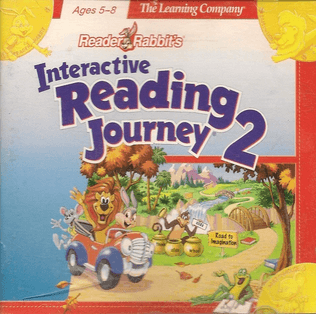Reader Rabbit's Interactive Reading Journey 2 facts for kids
Quick facts for kids Reader Rabbit's Interactive Reading Journey 2 |
|
|---|---|

Cover art
|
|
| Developer(s) | The Learning Company |
| Publisher(s) | The Learning Company |
| Platform(s) | Windows, Macintosh |
| Release date(s) | October 15, 1996 (Original) 1997 (re-release) 1998 (Ages 6-9) 1999 (Personalized) |
| Genre(s) | Adventure, edutainment |
| Mode(s) | Single-player |
Reader Rabbit's Interactive Reading Journey 2 is a fun computer game from 1996. It was made for Windows and Macintosh computers. This game helps kids aged 5 to 8 learn to read better. It is the seventh game in the popular Reader Rabbit series. It also follows up on the first Reader Rabbit's Interactive Reading Journey game. The game was updated and re-released several times. In 1997, it came out as Reader Rabbit's Interactive Reading Journey For Grades 1-2. Later, in 1998, it was called Reader Rabbit's Reading Ages 6–9. A special personalized version was released in 1999.
Learning to Read with Reader Rabbit
This game was created to help older children improve their reading skills. It aims to make them feel more confident when reading. It also helps them build strong language skills.
How the Game Helps Kids Learn
The game has many activities that teach different reading skills.
- Phonics: This helps kids understand how letters and sounds work together.
- Initial Letter Blends: Children learn about groups of letters that blend, like "bl" or "st".
- Word Recognition: This helps kids quickly recognize words they see.
Storybooks and Voice Recording
The game includes 30 different storybooks. These stories help kids understand what they read. They also help build their vocabulary. A cool feature is being able to record your own voice. This helps kids practice reading aloud. Even though some adults thought the game was a bit hard for younger players, the voice recording was seen as a great way to practice.
 | Leon Lynch |
 | Milton P. Webster |
 | Ferdinand Smith |

